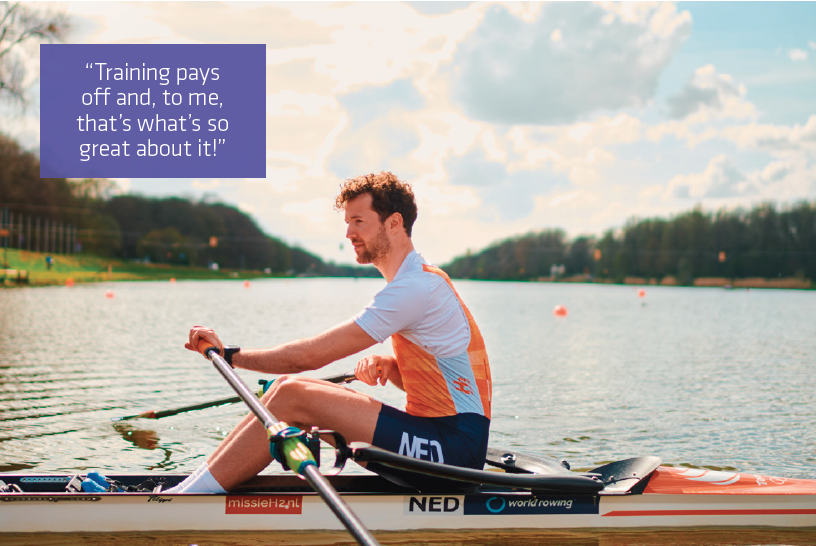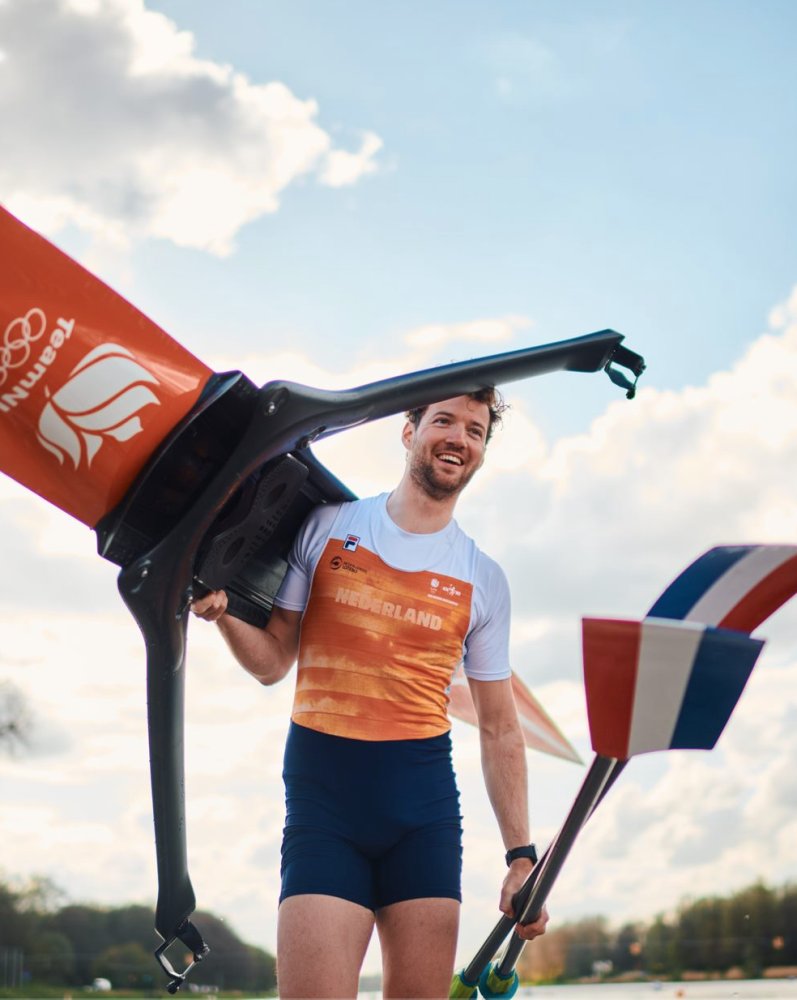INTERVIEW WITH MELVIN TWELLAAR, PROFESSIONAL COMPETITIVE ROWER AND EUROPEAN CHAMPION
“I STILL COUNT MY LUCKY STARS THAT THIS IS WHAT I GET TO DO FOR A LIVING”
He scored his first silver medal at the Olympic Games in Tokyo with crew mate Stef Broenink, and in 2022 was named Dutch athlete of the year. We’re talking, of course, about none other than world-class rower Melvin Twellaar (26). Last year he kicked off his career in the premier league of rowing – the solo skiff – winning gold at the European Rowing Championships. In 2018, Melvin left the country’s far north to settle in Amsterdam and follow his dreams of becoming a top athlete. Now, he cycles from his home near the RAI daily to train for his next ambition on the Bosbaan or Amstel.
Melvin, how did you get into rowing?
“Both of my parents are deaf. They attended a boarding school for the hearing impaired where they regularly got to try out all sorts of activities, and rowing was one. It wasn’t necessarily their thing, but they urged me and my brothers to have a go, and that’s how I fell in love with rowing when I was twelve or so. Overall, it wasn’t that popular a sport at that age as there was an idea that you could take it up later and still get to the top. That perception seems to be shifting.”
When did it go from being a hobby to a professional career?
“Back in Groningen I trained around thirteen times a week. When I started in Amsterdam, that jumped to around sixteen times a week and involved a lot more. From there I advanced in the selection and made it into the World and European Championships. The Netherlands assigns what’s known as ‘A status’ to top athletes who then get paid by the government, say if you qualify for the national team. Basically, it means your sport career is your job. It was after I officially put myself up for the selection in 2019 that it went from being a ‘full-time hobby’ to a professional career.”
Can you take us through a typical day in your life as a pro athlete?
“At eight in the morning we are ready for training, which I start with a big breakfast. We train on the Amstel most mornings. Those are long, thirty-kilometre sessions. In the afternoons we head over to the Bosbaan, where Topsport Amsterdam arranges all the meals. The meals are tailored to your individual training programme, so how many carbs you should be eating and things like that. Besides the boat training, we also do abs and strength training, or occasionally Pilates or cycling. In the evenings I crawl back home for an early bedtime to be ready for the next day.”
What makes rowing better than any other sport, for you?
“It’s a sport that’s really all down to training. In many sports, like football and hockey, there’s also a degree of chance. In rowing, though, output tends to equal input. Training pays off and, to me, that’s what’s so great about it! And I love being outdoors. Sometimes when we go to training camp in the Alps and we’re out on some lake surrounded by mountains, I still count my lucky stars that this is what I get to do for a living.”

You have racked up an impressive list of titles: Olympic Silver in Tokyo in 2022, Dutch and European champion, and 2022 Dutch Athlete of the Year. Which one are you proudest of? And why?
“They were all very different races and experiences. The European title last year was very meaningful for me because it was the first major qualification post-Covid. It was the first time my parents could come watch and after the last race everyone jumped into the water. It was a big party. The other competitions were all held without spectators. Obviously, it was amazing to be part of the Tokyo Olympic Games, but at the same time a very odd experience to row past all those empty stands. And then the steps you had to take every time to avoid infection and to get tested made it quite fraught.”
You started competing in the skiff last year. Do you have a preference for team competitions or rowing solo?
“My crew mate Stef went off to do a PhD and quit rowing full time. So, the idea to row solo really came about from external factors. When I got the chance to prove myself in the skiff competition, it turned out I had a knack for it. Both competitions have their up and downsides. Obviously, it’s brilliant to be a team working together to reach a goal. Whilst if you go for something on your own, and win, you know it’s all down to your own capability.”
Do you have your sights set on any particular competitive rowing goal at the moment?
“The Olympic qualifications are coming up again in six months. That’s my goal right now. Stef and I are entering again and are determined to take revenge this time. And it’s in Paris, so family and friends can come cheer us on. I’m really psyched about that.”
You’re also doing a degree in educational theory. Is that your future career?
“I finished a degree in sport studies before starting the educational theory programme in Amsterdam. That was a deliberate choice, because skiff rowing was more of the same and I wanted to dive into something completely different. I’m enrolled part time while rowing and should be graduating in two years. It’s important to me personally to develop myself outside competitive sport. I think working in education would be great, but I don’t have any definite ideas yet. Sport will always be my passion, so maybe I’ll be able to combine the two.”
What does the nearer future hold for you?
“Amsterdam will be hosting the World Championships four years from now. I would love to be a part of that. I’m not committing to anything, but it would be a brilliant home game. Beyond that, it’s so hard to predict what the future holds. But that’s what keeps every day interesting.”
